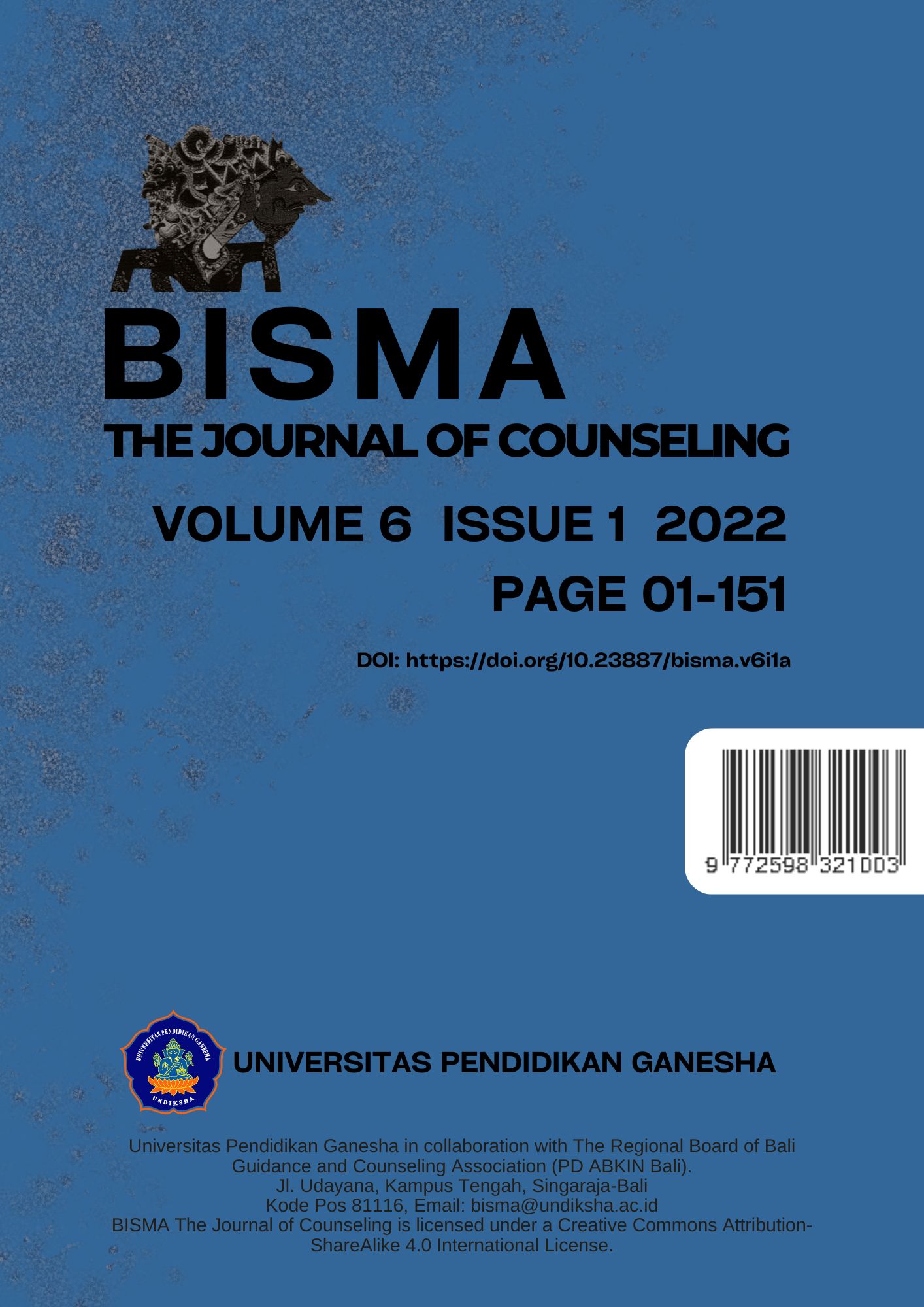SMART-R Counseling: Developing Student Resilience during the COVID-19 Pandemic
Keywords:
SMART-R counseling, strength-based counseling, resilience, covid-19Abstract
The COVID-19 pandemic that has lasted for two years is a dynamic condition that has an impact on all dimensions of life, including educational field. Various changes that appear in learning activities at school can not be denied has become a stressful situation that requires students to adapt quickly. Several findings have shown that there is a decrease in students' psychological well-being during the pandemic. This condition emphasizes that students need to have good psychological resilience so they are able to face difficulties and misfortunes, and be adaptive due the changes. The development of student resilience can be done through guidance and counseling services. SMART-R is a strength-based counseling model that can be implemented by counselors (BK teachers) to develop student resilience. Through the implementation of SMART-R counseling, students can have a more adaptive response in dealing with pressures and changes due to the COVID-19 pandemic, and can develop more positive feelings, thoughts, and behaviors.
References
Ardan, M., Rahman, F. F., & Geroda, G. B. (2020). The influence of physical distance to student anxiety on COVID-19, Indonesia. Journal of Critical Reviews, 7(17), 1126–1132. https://doi.org/10.31838/jcr.07.17.141
Cornine, A. (2020). Reducing Nursing Student Anxiety in the Clinical Setting: An Integrative Review. Nursing Education Perspectives, 41(4), 229–234. https://doi.org/10.1097/01.NEP.0000000000000633
de Shazer, S., Dolan, Y., Korman, H., Trepper, T., McCollum, E., & Berg, K. I. (2007). More Than Miracles: The State of the Art of Solution-Focused Brief Therapy. Taylor & Francis.
Engzell, P., Frey, A., & Verhagen, M. D. (2021). Learning loss due to school closures during the COVID-19 pandemic. Proceedings of the National Academy of Sciences, 118(17), e2022376118. https://doi.org/10.1073/pnas.2022376118
Gräbel, B. F. (2017). The relationship between wellbeing and academic achievement A systematic review. 33.
Hammerstein, S., König, C., Dreisörner, T., & Frey, A. (2021). Effects of COVID-19-Related School Closures on Student Achievement-A Systematic Review. Frontiers in Psychology, 12(September), 1–8. https://doi.org/10.3389/fpsyg.2021.746289
Handarini, D. M. (2019). Kontribusi faktor-faktor non-kognitif pada prestasi belajar siswa sekolah menengah pertama. Psychology, Evaluation, and Technology in Educational Research, 1(2), 62. https://doi.org/10.33292/petier.v1i2.22
Ifdil, I., Putri, Y. E., & Amalianita, B. (2021). Stress and anxiety among adolescents, during the covid-19 outbreak. KONSELOR, 10(1). https://doi.org/https://doi.org/10.24036/0202094111941-0-00
Lee, J. (2020). Mental health effects of school closures during COVID-19. The Lancet Child and Adolescent Health, 4(6), 421. https://doi.org/10.1016/S2352-4642(20)30109-7
Li, J., Yang, Z., Qiu, H., Wang, Y., Jian, L., Ji, J., & Li, K. (2020). Anxiety and depression among general population in China at the peak of the COVID-19 epidemic. World Psychiatry, 19(2), 249–250. https://doi.org/10.1002/wps.20758
Liang, L., Ren, H., Cao, R., Hu, Y., Qin, Z., Li, C., & Mei, S. (2020). The Effect of COVID-19 on Young Mental Health. Psychiatric Quarterly, 91, 841–852.
Masten, A., Herbers, J., Cutuli, J., & Theresa, L. . (2008). Promoting competence and resilience in the school context. ASCA, 12(2), 76–84.
Oktawirawan, D. H. (2020). Faktor Pemicu Kecemasan Siswa dalam Melakukan Pembelajaran Daring di Masa Pandemi Covid-19. Jurnal Ilmiah Universitas Batanghari Jambi, 20(2), 541. https://doi.org/10.33087/jiubj.v20i2.932
Peraturan Menteri Pendidikan dan Kebudayaan Republik Indonesia tentang Bimbingan dan Konseling pada Pendidikan Dasar dan Pendidikan Menengah, (2014). simpuh.kemenag.co.id
Reivich, K., & Gillham, J. (2010). Building resilience in youth: The penn resiliency program. Communique, The Newspaper of The National Association of School Psychologists, 38(6), 17–18.
Siegel, D. . (1999). The developing mind: How relationship and the brain interact to shape who we are. Guilford Press.
Singh, S., Roy, D., Sinha, K., Parveen, S., Sharma, G., & Joshi, G. (2020). Impact of COVID-19 and lockdown on mental health of children and adolescents: A narrative review with recommendations. Psychiatry Research, 293(August), 113429. https://doi.org/10.1016/j.psychres.2020.113429
Suranata, K. (2017). Keefektifan Konseling Kognitif Perilaku dan Konseling Berbasis Kekuatan untuk Meningkatkan Resiliensi Akademik Siswa SMP. Universitas Negeri Malang.
Suranata, K. (2019). The pilot study of SMART-Resilience a psycho-educational program. COUNS-EDU: The International Journal of Counseling and Education, 4(3), 121–128.
Suranata, K., Atmoko, A., & Hidayah, N. (2017). Enhancing Students’ Resilience: Comparing The Effect of Cognitive-Behavior And Strengths-Based Counseling. 134(Icirad), 102–108. https://doi.org/10.2991/icirad-17.2017.20
Suranata, K., Susiani, K., Susanto, E., & Novitasari, Y. (2019). Evaluation of the effectiveness of smart-resilience interventions for middle school students: A pilot study. International Journal of Innovation, Creativity and Change, 5(5), 40–59.
VicHealth. (2015). Interventions to build resilience among young people: A literature review. Victorian Health Promotion Foundation. https://doi.org/https://doi.org/10.1.1.45.1447
Wu, Y., Sang, Z. Q., Zhang, X. C., & Margraf, J. (2020). The Relationship Between Resilience and Mental Health in Chinese College Students: A Longitudinal Cross-Lagged Analysis. Frontiers in Psychology, 11(February). https://doi.org/10.3389/fpsyg.2020.00108
Yates, T. ., & Masten, A. . (2012). Fostering the Future: Resilience Theory and the Practice of Positive Psychology. Positive Psychology in Practice, 521–539. https://doi.org/https://doi.org/10.1002/9780470939338.ch32
Downloads
Published
Issue
Section
License
Copyright (c) 2022 Kadek Suranata, Wayan Eka Paramartha, I Ketut Dharsana, Abu Yazid Abu Bakar

This work is licensed under a Creative Commons Attribution 4.0 International License.









